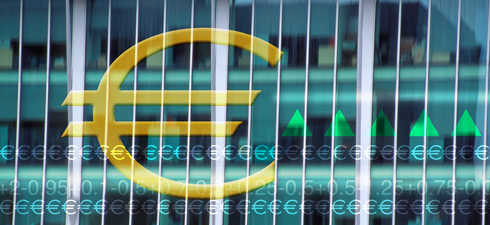“If the euro fails, then Europe fails.”
German Chancellor Angela Merkel
In the wake of financial chaos at the beginning of May which came close to wrecking the European monetary union, German Chancellor Angela Merkel went before the Bundestag to defend her attitude, which has often been criticised as too hesitant, to the European leaders’ 80 billion euro contribution to the Greek bailout initiative. Together with an agreement pledging a 440 billion euro stabilisation fund to protect vulnerable EU countries, the rescue package was barely sufficient to prevent the collapse of international financial markets on 6 and 7 May.
Staking everything on the euro
In the course of the debate which followed, obvious weaknesses in the structure of Europe’s monetary union were blamed for causing the crisis. The large number of eurozone countries which maintain budget deficits and levels of public debt that are well over agreed limits have never had to contend with any serious sanctions. French President Nicolas Sarkozy drew attention to the lack of a political counterweight to the European Central Bank (ECB) — which should take the form of a political union or economic government. Former German Chancellor Helmut Schmidt voiced his agreement in an interview with the Berlin based magazine Cicero: “At no time in the history of the world has there been a central bank that simply floated in space.”
In spite of these criticisms, Germany has continued to oppose the creation of an EU-level political and economic entity. For Angela Merkel’s government, the ECB simply needs to exercise its very considerable powers and stick closely to its anti-inflation policy. Instead of proposing the reform of the Maastricht Treaty, which led to the creation of the single currency and the ECB, Merkel has insisted on staking everything on it and declared that the “European ideal” cannot survive without the euro.
The euro as a reserve currency
It is a position that bespeaks a profoundly elitist attitude and fails to take into account the history of the single currency. More than a decade ago, in the debate that preceded the introduction of the euro, the arguments in its favour were generally along the following lines: it will help boost trade in the internal market and companies will no longer have to foot the bill for exchange rate transactions. And it is true that companies and tourists have benefited from some savings; however, attributing the growth in trade to the single currency is a hypothesis rather than a statement of fact. When the euro was introduced in non-physical form in 1999, customs barriers had already been removed and enlargement to include new markets in Eastern Europe was already on the agenda for the EU.
The third argument focused on the benefits to European economies of the new status of the euro as a reserve currency in competition with the US dollar. It was expected that an increase in the trade in euros would inevitably result in reduced exchange rate charges for eurozone companies and their customers, and lower costs for European states taking out loans in euros. Until the crisis this spring, these advantages were counterbalanced by the excessively high valuation of the euro, which raised the cost of exports to countries outside of the EU. And although today’s lower valuation may have helped to alleviate this problem, it should not be forgotten that the euro has been marked down as a result of a crisis in the European monetary union, which, in view of the fact that the euro is now a reserve currency, could have spread to the entire global economy.
Austerity will reduce probability of economic recovery
In short, the advantages of the single currency are by no means obvious, and it is in this context that we should question European leaders’ vehement insistence on the indissociability of the European project and the euro. On the one hand, there is no denying that the reintroduction of national currencies could create a domino effect, which they would be unable to control. But on the other, it is perfectly clear that the current status quo is not sustainable.
The asymmetric shock, which was notably forecast by American critics of monetary union, took the form of a regional financial crisis in the countries of southern Europe. The supposed remedy — forcing these states to implement draconian austerity measures — will only reduce the probability of economic recovery. At the same time, the insistence that northern European contries should save the euro by providing Greece, Spain and Portugal with huge amounts of capital is likely to promote a resurgence of euroscepticism and political decline. This situation should persuade politicians to explore more visionary alternatives, but until now, patching up the Union is the only option that has been put forward.
Was this article useful? If so we are delighted!
It is freely available because we believe that the right to free and independent information is essential for democracy. But this right is not guaranteed forever, and independence comes at a cost. We need your support in order to continue publishing independent, multilingual news for all Europeans.
Discover our subscription offers and their exclusive benefits and become a member of our community now!












